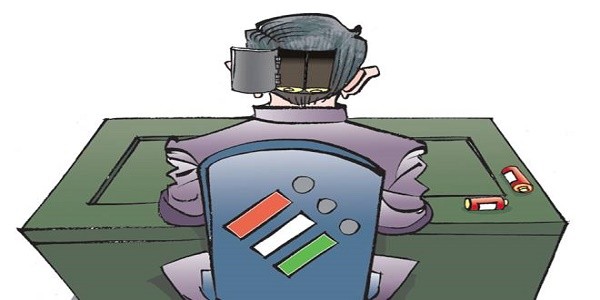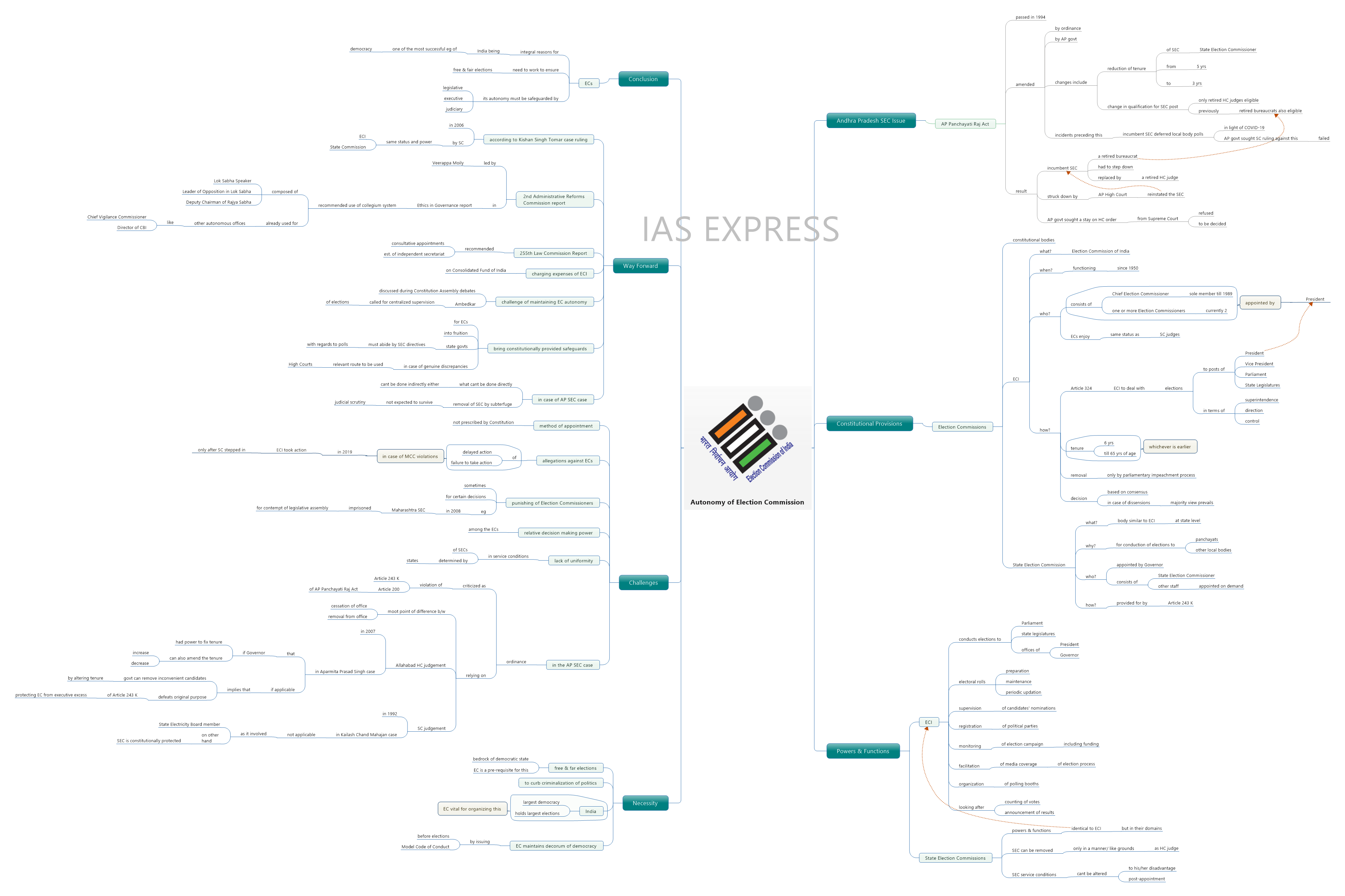Autonomy of Election Commissions- Andhra Pradesh SEC Case

From Current Affairs Notes for UPSC » Editorials & In-depths » This topic
IAS EXPRESS Vs UPSC Prelims 2024: 85+ questions reflected
In April, the Andhra Pradesh government’s decision to reduce the tenure of the State Election Commissioner was criticised as a threat to institutional autonomy. The issue has raised the question of the autonomy of the Election Commissions in India- especially in the states.
What is the Andhra Pradesh SEC issue?
- The Andhra Pradesh government promulgated an ordinance, in April, to amend the provisions of the Andhra Pradesh Panchayati Raj Act, 1994.
- Some of the changes brought in by the ordinances include:
- Tenure of the State Election Commissioner (SEC) was reduced from 5 years to 3 years.
- Restriction of the SEC post to only retired High Court judges. Earlier, retired bureaucrats were also eligible for the post.
- As result of the tenure reduction, the incumbent SEC (a retired bureaucrat) had to step down. He was replaced by a retired HC judge.
- The Andhra Pradesh High Court had struck down the ordinance in May and reinstated the retired bureaucrat back to the post.
- In June, the state government took the matter to the Supreme Court and sought a stay on the High Court’s order. This was refused by the apex court.
- The matter is to be decided on by the Supreme Court in the coming weeks.
- The ordinance comes in the backdrop of another issue. The incumbent SEC deferred the local body elections in light of the COVID-19 The state government sought to secure a favourable ruling from the SC against this deferment but failed.
- The government’s move is being called a ‘text book example of colourable exercise of power’.
What are the Constitutional provisions for Election Commissions?
- The Election Commissions are constitutional bodies– i.e. provided for by the Indian Constitution.
Election Commission of India
- Article 324 of the Constitution provides that the Election Commission of India (ECI) is to deal with superintendence, direction and control of the conduct of elections to the posts of President, Vice-President, the Parliament and the State Legislatures.
- The ECI has been functioning since 1950.
- It consists of a Chief Election Commissioner and one or more Election Commissioners. They are appointed by the President.
- They have a tenure of 6 years or up to the age of 65 years– whichever is earlier.
- Till 1989, the ECI only had a Chief Election Commissioner. After that, 2 Election Commissioners were also appointed to the ECI. Currently, the body has one Chief Election Commissioner and 2 Election Commissioners.
- They enjoy the same status as a Supreme Court judge.
- The Chief Election Commissioner can be removed from the post only by a parliamentary impeachment
- The ECI decides on matters by consensus. If there are dissensions, the majority view
State Election Commission
- Article 243 K of the Constitution provides for a similar body (State Election Commission) for the conduction of elections to panchayats and other local bodies.
- The State Election Commissioner is appointed by the Governor. Other staff to the Commissions are made available by Governor upon the request of the SEC.
What are the powers and functions of Election Commissions?
Election Commission of India
- Conduction of elections to Parliament and State Legislatures.
- Conduction of elections to the offices of President and Vice-President.
- Preparation of the Electoral Rolls and its maintenance and periodic updation.
- Supervision of candidates’ nomination.
- Registration of political parties.
- Monitoring of election campaigns including the funding.
- Facilitation of media coverage of the election process.
- Organization of polling
- Looking after counting of votes and the result declaration.
State Election Commission
- The powers and functions of the SECs are identical to those of the ECI. However, these are confined to their respective domains.
- Article 243K of the Constitution provides that the SEC can be removed from the post only in a manner and on the like grounds as a High Court judge.
- The service conditions of the SEC cannot be altered to his/her advantage post-appointment.
Why are ECs necessary?
- Election which are free and fair, form the bedrock of a democratic state.
- An independent and autonomous Election Commission is a prerequisite for ensuring such free and fair elections.
- The Election Commissions are required to curb the criminalisation of politics.
- India is the largest democracy in the world and holds the largest elections in the world. The Election Commission is vital for organizing this enormous task.
- It maintains the decorum of democracy by issuing the Model Code of Conduct before election.
What are the challenges?
- The method for appointment of the Election Commissioners has not been prescribed by the Constitution.
- There have been allegations of the Election Commissions either taking delayed actions or failing to take any action at all in case of MCC violations before elections. In 2019, the ECI took action only after the SC stepped in and issued a directive.
- In addition to this, the Election Commission have often faced difficulty in asserting their autonomy due to the political class’ tendency to command and control.
- Sometimes, the Election Commissioners even get punished for certain decisions. Eg: In 2008, the State Election Commissioner of Maharashtra was imprisoned for contempt of the legislative assembly.
- There is also the issue of relative power in decision making among the Election Commissioners.
- There is lack of uniformity with regards to the service conditions of the SECs. The states determine various aspects like appointment and tenure of the SECs.
- In the Andhra Pradesh SEC case, the ordinance is being criticised as a violation of the provisions of Article 243K which is further affirmed in the Section 200 of the AP Panchayati Raj Act of 1994.
- On the other hand, the government’s ordinance seems to have relied on the moot point of difference between ‘cessation of office’ and ‘removal from office’.
- The ordinance seem to have relied on a 2007 Allahabad HC judgement on the Aparmita Prasad Singh case and a 1992 SC judgement on the Kailash Chand Mahajan case.
- In the 1992 Kailash Chand Mahajan case, the ruling was with regards to a State Electricity Board member’s post- which is different from the constitutionally protected post of an SEC.
- In the Aparmita Prasad Singh case, the court held that if the Governor has the power to fix tenure by rule, he/she also had the power to amend the rule (for extending/ reducing the tenure). At the end of the prescribed tenure, the incumbent must vacate the post and this would not amount to ‘removal from office’.
- If this argument holds, governments can easily remove an inconvenient candidate in the State Election Commission simply by altering the tenure.
- This defeats the original purpose of protecting Election Commission from executive excess– as provided for by the Article 243K.
What is the way forward?
- Though the ECI and the State Election Commissions are independent of each other and have different domains of action, the Supreme Court clarified that they enjoy the same status and power in the Kishan Singh Tomar case of 2006.
- The 2nd Administrative Reforms Commission, led by Veerappa Moily, in its report on ‘Ethics in Governance’ suggested the use of a collegium system for appointment of the members of the poll panel.
- According to the recommendations, this collegium would be composed of Lok Sabha Speaker, Leader of Opposition in the Lok Sabha, Law Minister and the Deputy Chairman of Rajya Sabha.
- The 255th Law Commission report had recommended making the process for appointing Election Commissioners consultative. It also called for the establishment of an independent secretariat for the ECI. Similar provisions can be made for the SEC.
- When many other autonomous offices like that of the Central Vigilance Commissioner and the CBI Director are appointed using such a system, it could also be applied for the appointment of the Election Commissioners.
- Charging of expenses incurred by the ECI on the Consolidated Fund of India has been recommended for preserving the institution’s autonomy.
- The challenge of maintaining autonomy of the Election Commissions at the states was highlighted during the Constitution Assembly debates Ambedkar had called for centralizing the supervision of election.
- There is a need to bring the safeguards provided for the Election Commission members by the Constitution to fruition. The state governments must abide by the directions of the SECs when it comes to polls. In case of genuine discrepancies, the relevant route- High Courts– for addressing it can be used.
- In the case of the Andhra Pradesh SEC issue, it must be noted that what cannot be done directly cannot be done indirectly either- an established principle in law.
- Further, the removal of the SEC via subterfuge is not expected to survive the upcoming judicial scrutiny.
Conclusion
The Election Commission is an integral reason why India is one of the most successful examples of a democracy despite its wide diversity of ideologies. While the Election Commissions work to ensure free and fair elections to important posts in the government, the onus is on all the three branches- legislative, executive and judiciary to ensure its autonomy.
Practice question for mains
With reference to the recent ordinance promulgated by the Andhra Pradesh government with regards to the office of the State Election Commissioner, discuss the challenges and possible solutions in conduction of free and fair elections in India. (250 words)
If you like this post, please share your feedback in the comments section below so that we will upload more posts like this.


